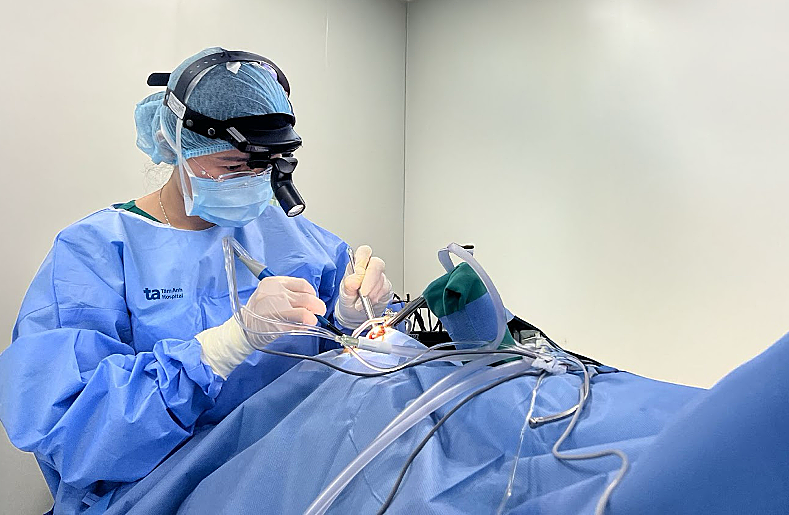Hung had been snoring for almost 20 years and suffered from recurring tonsillitis and nasopharyngitis. During his recent visit to Tam Anh General Hospital in Ho Chi Minh City, Dr. Pham Thi Phuong of the ENT Center diagnosed him with several conditions, including a deviated nasal septum, enlarged inferior turbinates on both sides, nasopharyngeal cysts, enlarged tonsils, a narrow throat, and congested laryngopharyngitis. A sleep study confirmed that he had obstructive sleep apnea, for which snoring is a common symptom.
The doctor recommended a "4-in-1" surgical procedure to address all 4 issues simultaneously. The team first removed Hung's tonsils using coblation, a radiofrequency surgical technique. They then reshaped his soft palate and uvula, removing a portion of the soft palate and uvula along with excess mucosal tissue in the throat to widen the airway. Finally, they performed endoscopic surgery to correct his inferior turbinates and deviated septum.
 |
Dr. Phuong performs the "4-in-1" surgery on Hung. Photo: Tam Anh General Hospital |
Dr. Phuong performs the "4-in-1" surgery on Hung. Photo: Tam Anh General Hospital
Three weeks post-surgery, Hung's incisions healed well, his airway was clear, and he no longer experienced shortness of breath or gasping during sleep. His snoring and nighttime awakenings also ceased.
Snoring can be caused by physiological or pathological factors. Frequent snoring accompanied by obstructive sleep apnea and persistent fatigue after waking up, even after adjusting weight and sleep position, can indicate an underlying medical condition. Some conditions that can cause snoring include enlarged tonsils, a narrow throat, a deviated nasal septum, an enlarged tongue base, and nasopharyngeal tumors.
Surgery for snoring is recommended when there is peripheral obstruction causing sleep apnea and when non-surgical treatments are ineffective. Patients can also use continuous positive airway pressure (CPAP) therapy, which delivers oxygen during sleep and helps alleviate snoring.
People who snore due to physiological factors can try lifestyle changes such as exercising regularly, maintaining a healthy diet, managing their weight, quitting smoking and drinking alcohol, elevating their head while sleeping, and sleeping on their side to reduce snoring.
Uyen Trinh
| Readers can submit questions about ENT issues here for doctors to answer. |












